Why Can’t the United States Withdraw from Gaza Negotiations?

For months, the United States has seemed to be chasing a mirage: on one hand, the issue of hostages in Gaza, and on the other, ending the suffering of civilians there and stopping the war.
-
Netanyahu between Street Anger and the Grip of the Right… Limits of Tolerance “at Risk”
-
Trenches in Gaza: Netanyahu “Proposes” a “Pre-Rejected” Plan
But its goal has never been more distant than this, according to the American network “CNN.”
The network observes that it is rare for President Joe Biden‘s administration to have been so distanced from Prime Minister Benjamin Netanyahu since the Hamas surprise attack on October 7 last year, followed by the brutal Israeli war on the territory.
While Washington claims that the ceasefire agreement in Gaza is now nine-tenths complete after diplomacy involving the U.S., Qatar, and Egypt, Netanyahu denies that it is near completion.
-
New Failure for Netanyahu: Military Summons Drive “Haredim” to Protest
-
Biden threatens Netanyahu with “Support Umbrella”: Has the President lost patience?
Why Can’t the United States Withdraw?
CNN points out that the motivations leading the administration into this vicious cycle of failure have not changed, and thus Washington cannot give up.
Indeed, Biden is under increased pressure to secure the release of Americans believed to be held in Gaza after the death of Hirsch Goldberg-Poulin, an American-Israeli among the six hostages found dead last Sunday in a Gaza tunnel.
Additionally, the American administration’s strong desire to prevent the regional conflict from spreading also means that ending the war remains essential.
-
Gaza Agreement: Biden « Freed » from Elections Pressures Netanyahu
-
Hamas awaits Netanyahu’s response amid Israeli protester pressures
The White House also has political and humanitarian motivations for ending the suffering of Palestinian civilians. The outrage over these losses, particularly among progressives and Arab-American voters, could threaten Vice President Kamala Harris’s hopes in the key battleground state of Michigan, for instance.
In this regard, the American network notes that Biden‘s decision to end his re-election efforts has given a new and personal dimension to the Middle East crisis for the president. If a ceasefire is not reached in the coming months, he may face the prospect of leaving his successor with a failure that could shape his legacy.
-
Hamas Remaining in Power and Ceasefire Demand: Israeli Army’s Requests Anger Netanyahu
-
Why Did Netanyahu Prevent Gallant and the Shin Bet from Making Independent Decisions?
A senior Democrat close to the White House told CNN that Biden had intensified his focus on the Middle East since halting his campaign, becoming “obsessed” with the issue.
Despite his frustration, the White House has not yet used all possible leverage on Netanyahu – and might not, according to the source.
It is well-known that Biden is a staunch supporter of Israel and has so far been unwilling to yield to progressive demands to restrict U.S. arms sales to Tel Aviv to pressure Netanyahu.
-
The United States Refuses to Impose Sanctions on the ICC Over Netanyahu Arrest Warrant
-
Advisor to the Palestinian President: Hamas has caused the crisis… and Netanyahu continues his obstinacy
However, this attempt is unlikely to succeed. The prospect of the U.S. distancing itself from Israel and publicly blaming the Israeli Prime Minister for this deadlock seems unlikely, according to CNN.
The tense political conditions also make it difficult, despite Harris’s willingness to adopt a firmer stance toward Netanyahu, to plan a rift with Israel as one of her first major steps in foreign policy if she were to become president.
-
Lapid to Netanyahu: “Get Out of Our Lives”
-
Autumn Winds – 3 Factors tensioning relations between Biden and Netanyahu
Netanyahu‘s Domestic Political Maneuvering
Netanyahu‘s recent justifications for not finalizing a deal center on his refusal to withdraw his troops from the Philadelphia axis on the Gaza-Egypt border, which he says is crucial for Hamas’s ability to maintain its weapons supply.
Netanyahu has left no doubt that he views the war against Hamas as part of a broader conflict against Iran and its proxies, a position that implies he is thinking beyond simply pushing for a deal with Hamas, according to CNN.
-
Israel accused of financing Hamas… EU pressures Netanyahu
-
Pressure on Netanyahu to continue the war… Otherwise, the fate of the government is at stake
While facing intense political pressure from the families of remaining Israeli hostages to make more efforts to secure their release – especially with the resumption of street protests in recent days – the opposition to his continuation as Prime Minister has not reached the critical mass necessary to oust him.
Many analysts believe Netanyahu wants to continue the war to delay the inevitable investigations into how the worst attack in Israel’s history occurred during his tenure.
Netanyahu would be more vulnerable to charges of fraud and bribery and the trials he faces if he were out of office.
-
Who will govern Gaza after the war? Netanyahu answers
-
The families of the hostages: Netanyahu chose to abandon the prisoners as a strategy
However, in Israel, Netanyahu remains in a state of political stasis. His coalition – the most right-wing in Israel’s history – has held firm, raising questions about whether the Biden administration has correctly assessed the likelihood of his remaining and what is politically feasible.
For Aaron David Miller, a former U.S. peace negotiator for the Middle East, the key figure in Netanyahu‘s mind is not the tens of thousands of Israelis protesting against him in the streets, but “64,” referring to the number of seats his coalition controls in the Knesset.












